View Style in 3D Scene |
  
|
T-FLEX CAD supports various styles of displaying 3D models. The selected style is applied to all elements in the current 3D view window. It only affect the visualization method, without affecting the model itself. Each style also has additional options.
A view style is a characteristic of a particular 3D window, and does not depend on the active camera. The same model may be simultaneously displayed in different 3D windows using different styles.
A view style and its options may be selected using the dialog of 3D view parameters or using the view styles drop-down list:
Icon |
Ribbon |
|---|---|
|
View > 3D Model > View Style |
Keyboard |
Textual menu |
|
|
The list is also accessible via the View toolbar:
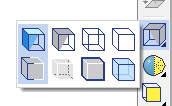
Following styles and options are available in the list:
Call the command:
Icon |
Ribbon |
|---|---|
|
View > 3D Model > View Style > Render |
Keyboard |
Textual menu |
<3VD> |
View > Render > Render |
After calling the command, a three-dimensional model with the materials assigned to the bodies and the installed light sources will be displayed in the 3D view window.
In addition to material each body as whole and each individual face of a body in the 3D scene has its own color. Colors are not visible in this view style.
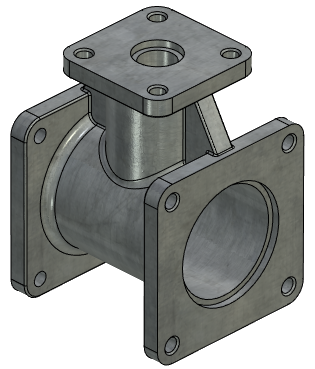
Call the command:
Icon |
Ribbon |
|---|---|
|
View > 3D Model > View Style > Shading |
Keyboard |
Textual menu |
<3VS> |
View > Render > Shading |
After calling the command, the 3D view window will display a three-dimensional model with shading.
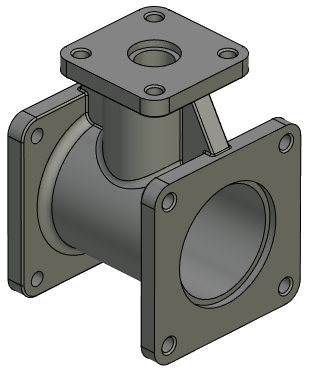
Only this view style represents colors and transparencies of particular faces set in face parameters dialog.
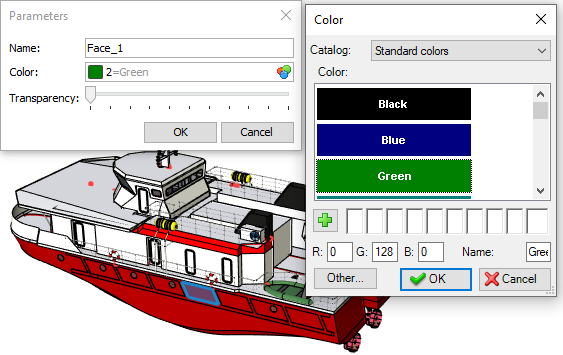
Call the command:
Icon |
Ribbon |
|---|---|
|
View > 3D Model > View Style > Wireframe |
Keyboard |
Textual menu |
<3VW> |
View > Render > Wireframe |
You can see the wireframe view style of your model after using this command.
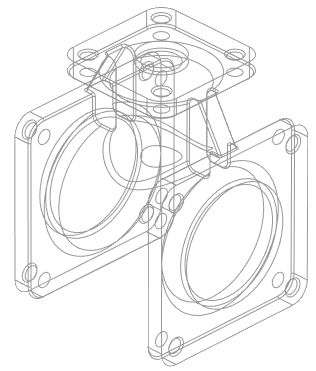
The wireframe view style may also be applied individually to particular bodies. Such bodies will be rendered as wireframe always, regardless of the view style set for the 3D window. The wireframe style can be enabled for a body in its parameters dialog or in parameters dialogs of operations forming the body.
Call the command:
Icon |
Ribbon |
|---|---|
|
View > 3D Model > View Style > Hidden Line Removal |
Keyboard |
Textual menu |
<3VH> |
View > Render > Hidden Line Removal |
After calling the command, the 3D view window will display a three-dimensional model with the removed hidden lines.
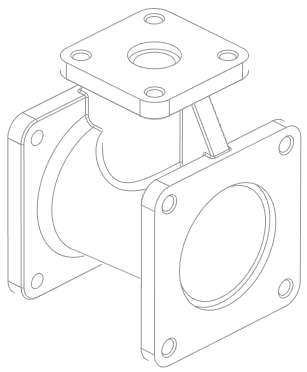
Call the command:
Icon |
Ribbon |
|---|---|
|
View > 3D Model > View Style > Precise Hidden Line Removal |
Keyboard |
Textual menu |
<3VZ> |
View > Render > Precise Hidden Line Removal |
After calling the command, the 3D view window will display a three-dimensional model with precisely removed hidden lines. The difference between this command and the Hidden Line Removal command is that the resulting image is much more accurate.

Call the command:
Icon |
Ribbon |
|---|---|
|
View > 3D Model > View Style > Show Edges |
Keyboard |
Textual menu |
<3V1> |
|
This command is an additional setting for the main view styles. You can only use it with a Render and a Shading. In this mode, all edges are shown.

Call the command:
Icon |
Ribbon |
|---|---|
|
View > 3D Model > View Style > Show Hidden Edges |
Keyboard |
Textual menu |
<3V2> |
|
This command is an additional setting for the main view styles. It can only be used in conjunction with a Hidden Line Removal command. In this mode hidden lines become dotted.
|
|
Don't show hidden lines |
Show hidden lines |
Call the command:
Icon |
Ribbon |
|---|---|
|
View > 3D Model > View Style > Show Outline Edges |
Keyboard |
Textual menu |
<3V3> |
|
This command is an additional setting for the main view styles. In this mode, outline lines are added.
|
|
Don't show outline edges |
Show outline edges |
Call the command:
Icon |
Ribbon |
|---|---|
|
View > 3D Model > View Style > Semitransparent View |
Keyboard |
Textual menu |
<3VM> |
View > Render > Semitransparent View |
This command is an additional setting for the main view styles.
|
|
View by default |
Semitransparent View |
Transparent view style may also be applied individually to particular bodies of the model. But such bodies will be displayed as transparent, only when shading or shading with materials view style is used. The transparency can be enabled for a body in its parameters dialog or in parameters dialogs of operations forming the body.
Moreover, there is a possibility to make transparent the individual faces of bodies. This can be done in the parameters dialog of face. Transparency of faces is also visible only when shading or shading with materials view style is used.